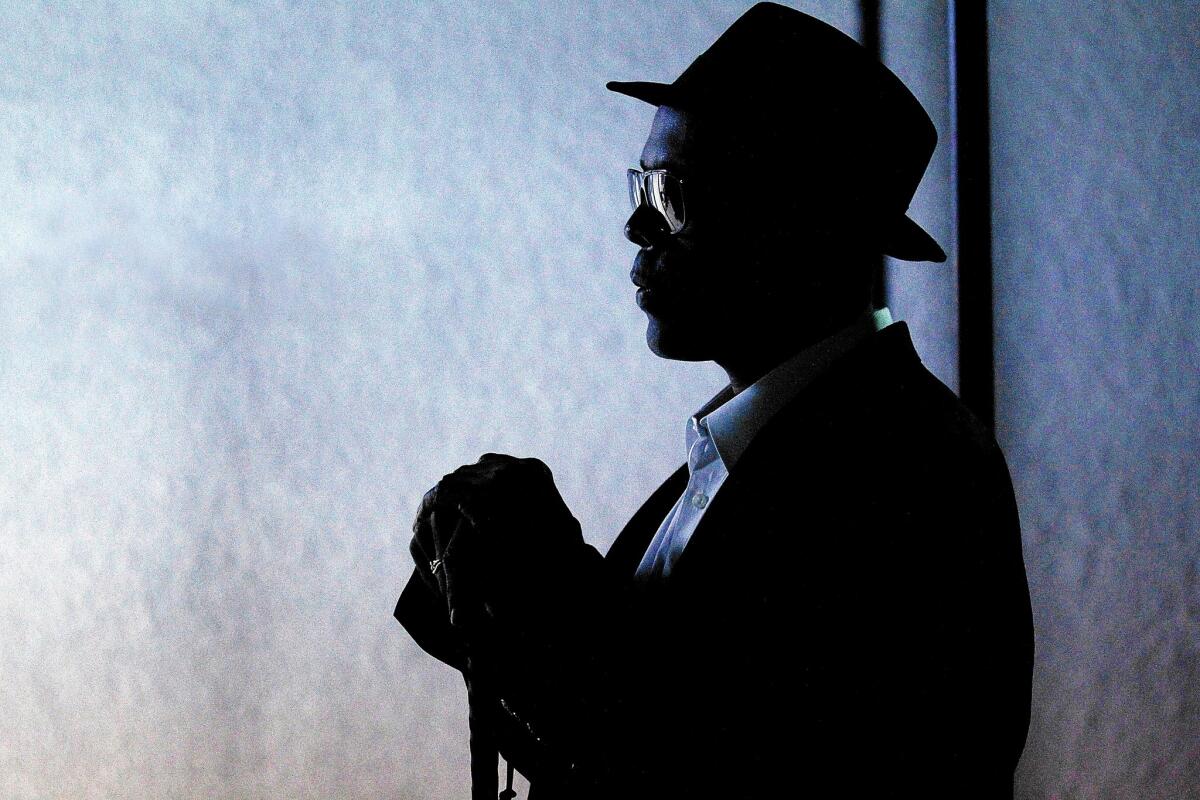Lynn Manning dies at 60; blind poet, athlete, Watts theater group founder

- Share via
After a stranger blinded him with a gunshot to the face at a Hollywood bar, Lynn Manning never thirsted for revenge. He had a life, after all.
At 23, he had to learn how to get around by himself. To stay fit, he took up martial arts and became a world champion in blind judo. To stay sane, he wrote funny, angry, poignant poems and read them at poetry slams. To grapple with stage fright, he studied acting. To find his voice on a tangle of profound issues that were wrapped up in having a disability and being an African American, he wrote acclaimed one-act plays and co-founded a theater company in Watts.
Manning’s assailant tangled with him in a pinball tournament and came back with a gun. He was never found.
“I sincerely hope he gets what’s coming to him, but I don’t dwell much on it,” Manning told a Pennsylvania newspaper, the Allentown Morning Call, in 2007. “Some say it’s important for a victim to get closure, but I think if you need that sort of thing to move forward, you’re still a victim.”
Manning, who last month attended a White House celebration on the 25th anniversary of the Americans With Disabilities Act, died Monday at his Los Angeles home. He was 60.
He had liver cancer, said Eric Inman, managing director of the Watts Village Theater Company, a group established by Manning and local activist Quentin Drew in 1996.
The group, which at times has eked by on bare-bones budgets, offers professional theater in one of the city’s poorest neighborhoods. Manning was its guiding spirit and artistic director.
“He spoke about how theater had the ability to give light to those who would otherwise be invisible,” Inman said, “whether in the underserved community of South L.A. or to those in the disabled community.”
After he lost his sight, Manning discovered disturbing similarities between the two worlds. In his poem “The Magic Wand,” he vividly summed up the prejudices he encountered daily:
Quick-change artist extraordinaire,
I whip out my folded cane
and change from Black Man to ‘blind man’
with a flick of my wrist.
From God-gifted wizard of round ball
Dominating backboards across America
To God-gifted idiot savant
Pounding out chart busters on a cockeyed whim;
From sociopathic gangbanger with death for eyes
To all-seeing soul with saintly spirit…
“My final form is never of my choosing,” he reminded his listeners. “I only wield the wand; you are the magician.”
In his plays, Manning often riffed on the themes of discrimination and violence.
In 1990, he based “Shoot” on the true story of a blind friend who navigated L.A.’s mean streets with a 9-mm handgun for protection. In “Before the Drive to Oakwood Station,” he wrote a 20-minute monologue by a postal worker who had just killed his family and was about to take out his co-workers and himself.
Manning’s best-known piece is the autobiographical “Weights,” which traces his life from a tortured childhood up to the shooting. In addition to his Los Angeles performances, Manning played himself in productions off-Broadway as well as in Edinburgh and Adelaide, Australia.
“In the absence of that vastness, that visual feast, I came to recognize the overwhelming distraction that sight had been,” he told his audience.
“I had never noticed that sound moves the way it does, or feels the way it does. And what about this pulse, this radiation that flows from all things? And the smells! Good God! The smells! Who knew such sensory lushness existed in this more immediate realm? Blind people had to have known all along.”
Born in Fresno on April 30, 1955, Manning grew up in a large family in South L.A. When he was 7, his mother nearly killed his stepfather with a butcher knife. Over the years, he lived in six foster homes and attended nine schools.
Despite tough circumstances, he did well. He studied art at Los Angeles Community College and dreamed of becoming a painter in Paris.
But Manning was accustomed to loss, and dreams were just something else to lose.
“Growing up, I had developed a habit of always preparing for the worst,” he said in a 2014 Times profile. “Even before the shooting, I’d thought, ‘Since you love painting so much, how would you survive if it was taken away from you?’ It was hard for everyone around me to believe, but I looked at it like this wasn’t the worst thing that ever happened.”
Within a year of his shooting on Oct. 25, 1978, Manning started his judo lessons at the Braille Institute in Los Angeles. In 1990, he took gold at the World Games for the Disabled in the Netherlands, and silver at the 1992 Paralympics in Barcelona.
“For me, it was a really good outlet for anger and getting out my frustration of living blind in a sighted world,” he told a University of Oregon publication in 2008.
In 1989, he was a technical adviser to actor Rutger Hauer, who played a blind, sword-wielding, karate chop-throwing action hero in the film “Blind Fury.”
“Lynn taught me how to unfocus my eyes, to react to smells and sounds,” Hauer told People magazine. “He could pick up the patterns of your breathing if you were upset.”
Manning also appeared in commercials and had small roles on several TV shows, including “Seinfeld.”
Divorced twice, he is survived by his father and several brothers and sisters. His sister Dorothy Raybon described him as “a genius and a survivor who was deeply loved by all.”
Twitter: @schawkins
More to Read
Start your day right
Sign up for Essential California for the L.A. Times biggest news, features and recommendations in your inbox six days a week.
You may occasionally receive promotional content from the Los Angeles Times.







